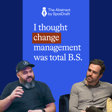
Finding Empowerment in Disability: Raj Mahapatra, Senior Counsel at Wilson Sonsini
How do you turn one of the most difficult moments in your life into the motivation that guides you to make the world a better place?
When Raj Mahapatra received his axial spondyloarthritis diagnosis, he was told he would spend his life in a wheelchair. Decades later, he is an accomplished long-distance runner, seasoned general counsel, tech start-up business operator, mission-driven climate advocate, and chairman of the charity that makes life better for people suffering from his condition worldwide.
Listen as Raj recounts his journey to leadership, explains the importance of advocating for your personal needs, and shares why it is so important for GCs to never stop asking “why?”
Read detailed summary: https://www.spotdraft.com/podcast/episode-26
Topics:
Introduction: 1:20
Receiving a life-changing diagnosis in your twenties: 2:45
Changing your perspective on work by living with a disability: 6:27
Incorporating charity into your running practice: 13:17
Going beyond legal roles and into operator positions: 20:41
Fundraising as General Counsel and Head of Intellectual Property at Cervest Limited: 24:45
Reflecting on the experience of building and losing a business as a lawyer: 32:13
Resetting after a difficult work experience: 35:58
Joining Wilson Sonsini Goodrich & Rosati as Senior Counsel: 42:19
Building a meaningful life: 51:28
Connect with us:
Raj Mahapatra - https://www.linkedin.com/in/rajmahapatra/
Tyler Finn - https://www.linkedin.com/in/tylerhfinn
SpotDraft - https://www.linkedin.com/company/spotdraft
SpotDraft is a leading CLM platform that solves your end-to-end contract management issues. Visit https://www.spotdraft.com to learn more.



















